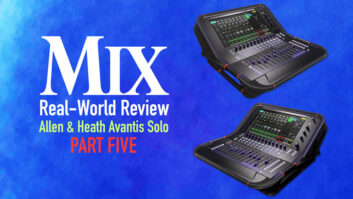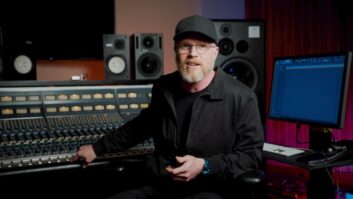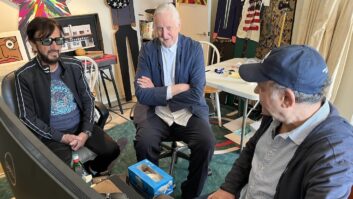It’s a tough assignment: an interview with He-Who-Hates-To-Be-Interviewed. That sharp-tongued, laser-eyed, hypercritical guy who’s been there, done that, everywhere, with everything. In other words, the conundrum known as Don Henley, who, on May 23, released his third solo album, 11 years after its predecessor, the quintuple-Platinum The End of the Innocence.
Outspoken, opinionated, and just a touch grouchy, Henley’s a complex personality. A native Texan who has lived most of his life in L.A., and now officially resides in Texas again, he’s ruled by dichotomy. He’s impatient but polite, judgmental but tolerant; he places a premium on privacy, but he also has a driving need to be heard. And he’s at least as critical of himself as he is of anyone or anything else. It’s probably apt to say that Henley lives something paraphrased from Socrates called “the examined life.”
Of course, living the examined life creates great fodder for a songwriter, and although Henley still, unbelievably, doesn’t seem to be sure that he is one, his body of work leaves no doubt. The Eagles: Their Greatest Hits 1971-1975, featuring classics he wrote with partner Glenn Frey like “Tequila Sunrise” and “Desperado,” is the top-selling record of all time, certified 26 times Platinum. Then there was the 15 million-selling Hotel California, on which that duo wrote (with Don Felder), among other tunes, the classic title cut. Henley’s three previous solo albums, which together have sold more than 9 million units, boast the hits “Dirty Laundry,” “In a New York Minute,” “The Heart of the Matter” and “The Boys of Summer.”
Henley’s new CD, co-produced with his friend, former Tom Petty drummer Stan Lynch, is titled Inside Job. It’s full of memorable melodies and soulful singing, but what’s really remarkable about the record is its lyric intelligence, which stands in rather stunning contrast to so many current endeavors. Combining love songs with vintage Henley-style biting social commentary, Inside Job is a mature work that takes cynicism and anger beyond bitterness, into knowledge and sorrow, and finally, offers cautious redemption through love. The love Henley sings about is never naive, though; it’s tempered with experience and a hard-won understanding of how fragile it is in this world.
This interview took place at Hollywood’s Record Plant over two days while Henley took breaks from a hectic schedule that included laying down last-minute vocals and shooting a VH1 Storytellers segment. After stating up front that he dislikes being interviewed and didn’t want to be asked any of the “same old questions about songwriting,” he proceeded to answer all my questions thoughtfully and graciously, in that unmistakable voice that still retains its East Texas lilt.
You worked at a few different studios on this album.
Well, I’ve been here at Record Plant for about two years on this particular album. [Laughs] We’ve been back and forth between this place and my studio in Malibu. Since I’m in town rehearsing the band every day, it’s a lot closer to drive here, and also sometimes you really need a 9k [SSL 9000 Series console] to get the job done.
I like it here. The Record Plant has managed to maintain that family feeling that was present in the ’60s and ’70s. It’s much more personal at this studio than it is at a lot of the others. It still feels sort of homey and warm. A lot of that is due to Rose [Mann] and the way she operates the place. She tries to get good employees, and she takes care of people. Also, it’s centrally located, it’s got lots of good restaurants around, and most importantly, it’s near an In N’ Out Burger.
What’s your studio like?
Well, it took a little longer to build than anticipated, as these things always do. It took a little over two years to build it-not just the electronics but the decor as well. I always thought that most recording studios are creative places that look like factories. So I wanted my studio to be beautiful; I wanted the interior to have something of a spiritual aesthetic that included icons from different cultures.
Do you think that the objects you have in there have power to help make it a creative space?
I don’t know if I’d use the word power. I think they help create an atmosphere of contemplation where one can think larger thoughts in a world where everything has been dumbed down to the lowest common denominator. I keep a lot of my favorite books there, and my favorite CDs. I have things from the Christian religion, things that pertain to Buddhism and Hinduism, things that pertain to the Muslim religion. I have pagan things in there, Celtic things-mainly they have aesthetic value.
How about equipment?
I have the original API board that was in the Sausalito Record Plant; I wish that board could talk! I bought it back in the early ’80s and stored it for a long time. Then I had it rebuilt and stored it again. It was in storage for so long that I had it rebuilt a second time. It has a great, warm sound. The studio was designed by a team which included my engineer, Rob Jacobs, my technical support guy, Art Kelm, studio designer Vincent Van Haaff, architect David Sawyer, Stan Lynch and myself. Rob, Stan, Art and I decided what kind of outboard gear we were going to get. I purchased a Sony 48-track digital machine, and a Studer 24-track analog machine and I’ve got this great old 3M machine that I bought around the same time I bought the board. It’s 24-track with interchangeable 16-track heads. Unfortunately, I really haven’t used it much yet because we’re having trouble finding some parts.
The studio owner’s constant complaint these days. Do you run your recording equipment yourself sometimes or do you always use an engineer?
I’m not very technology-oriented. In fact, I don’t even work on a computer. I don’t have e-mail. My assistant does, but I don’t. It’s a matter of privacy with me. The phones and the fax machine are going all day long. I’m constantly inundated, so I don’t need another medium to make my life even more complicated.
But I have lots of smart guys who work with me who are very astute when it comes to computers and other electronic gadgetry. Rob Jacobs and Stuart Brawley are both extremely competent. Stuart did a large portion of the Pro Tools work on the album.
Would you say there’s a theme to the new record?
I would. First of all, 11 years have gone by since my last studio album and a lot has happened in that time, including The Eagles’ reunion. My life has changed a great deal. To use the vernacular, I was “getting a life” and I think this album reflects that.
I’m still deeply concerned about a lot of things and that concern is reflected on the album, but it’s tempered. There’s a song for my daughter, there are some environmental things and some political things: a song about the music business. Actually, it’s kind of a combination song about the music business and the film business-the media in general, the arts/entertainment industry or whatever they’re calling it this week.
The corporate thing is really bothering me: what it’s done to the music business and what it’s done to the nation in general. Not so very long ago, all of these mergers would have been called monopolies, but now our government just looks the other way. It’s ripped the soul right out of everything as far as I’m concerned, with greed and bottom-line consciousness. My partner Stan [Lynch] was talking the other day about the ads on the Super Bowl. They were all about getting rich quick. If you do this “me” thing or this Internet thing or buy this stock-it’s all about getting something for nothing or doing little to no work to get rich. There’s this sense of entitlement. The album deals with things of that nature.
Did you play drums on the record?
Not much. A couple of songs. There are a lot of loops and samples-all homemade primarily by Stan. He plays some drums on the record, as well as Gregg Bissonette and Scott Crago.
Did you play guitar on the record?
Nah, don’t want to ruin a good thing.
Piano?
Nah. I could, but it wouldn’t be as good as somebody else doing it. I don’t have that kind of ego; I don’t need to do it just to say I did it. I’d rather have somebody come in and do it in an hour or two while I enjoy it and listen to it objectively from a distance. I see no point in insisting that I play a particular part if it’s going to take two or three days. I feel the same way about drums. There are so many drummers here better than I am-I’d much rather let them do it, although as a producer, I might have something to say about the part and how it’s played. On my solo tours I’m not going to be playing drums much either; I’d rather reserve that for The Eagles.
Is there a day that officially started this record? Or did it just kind of ebb and flow until finally you were in the middle of it?
It always starts in a more or less amorphous, hazy fashion. Then at some point, it becomes a more defined effort. It begins with a lot of conversations: “Who are we going to write with? Where are we going to record?” When I started the record, my studio wasn’t finished and since we do a lot of writing in the studio, I had to find a place to work. We actually started, I think, in October of ’97 in Jai Winding’s little studio in Santa Monica.
“Goodbye to the River” was one of the first songs, and one of the very first things was the music for what eventually became “My Thanksgiving.” For the rest, we usually started with song titles or concepts. Sometimes it simply starts with subject matter. I might have only a couple of lines, lyrics plus maybe a part of the melody. Or sometimes somebody will make me a track, and I’ll start with that. Stan has become very adept at creating tracks and submitting them. That’s generally my preferred way to write.
Do you still like to write while you’re driving?
Yeah, that’s still my favorite way. I do my best work on Pacific Coast Highway between Zuma Beach and Sunset Boulevard. I drive back and forth between my studio and my rent-a-house here. There’s so much traffic on Pacific Coast Highway these days that you can’t be quite as contemplative as you once could, or you’ll have a serious car wreck. But I still manage to do it, especially late at night.
I read a quote from Danny Kortchmar who said that you had a “unique and lucky perspective” as a songwriter because you’re a drummer and you don’t really play a harmony instrument. Instead, you write purely on melody.
That’s right, I suppose. That’s an interesting comment.
Sometimes lyrics and melody come at the same time; it’s almost a simultaneous process because each word has to have the right note underneath it to support it and make it believable. I’m fascinated by the writing process, because it’s still sort of a mystery to me. It’s kind of silly to call it writing because it’s not. It would be more correct to say I don’t write songs, I make them up.
You said somewhere it’s sort of a channeling thing, almost.
Yeah, although I hate to use that term, because it’s pretty fruitcake…
Okay, the songs come to you somehow, and you just have to clear the way for them.
Yeah, but I’ve learned to do it now without clearing anything. My life is more complicated, more complex than it’s ever been. I’m involved in so many other things-politically, environmentally, familywise-and I’ve learned how to write even in the middle of all this chaos. That’s why driving is good, although car phones have interrupted the process a bit. But when I’m out on the Coast Highway-if I look toward the ocean side-at least half the world goes away.
You were an English major back in college. Did you ever write poetry or were your words always set to music?
I took a stab at poetry a couple of times. Songwriting is hard, but I think good poetry might be more difficult. I don’t think poetry and song lyrics are necessarily the same thing. Granted, there’s a tremendous amount of bad poetry out there and there’s an equally tremendous amount of bad lyrics. But people can skate on bad lyrics because you’ve got the music production to shore them up. A pop recording doesn’t rise or fall on just the words alone. You have other elements of melody and track all of the technological wizardry that you can apply to the production.
You can cover yourself. When you turn on the radio now, or watch the Grammys, it’s obvious that lyrics don’t really matter much in most genres-but they matter to me. I think there are very few people who are writing good lyrics. Because of the place in the forefront of recording that production has taken, we’re definitely living in an age of form over content. So, I’m a bit anachronistic in that way. I read a lot and I write about what I read. My writing reflects the things about which I feel strongly.
Do you tend to work on one song until it’s done or do you move around?
I move around. If I work on one song too long, I tend to get sick of it. If I get stuck or lose inspiration, I sometimes lose the song. So, it’s great to have three or four things to work on at the same time. Although it’s hard to keep them separate because sometimes I’ll write lyrics that could go into two or three different songs. Then, I have to go through the somewhat agonizing decision of which song would be better served by those lyrics.
Stan has played on your records before, but this is the first time you’ve collaborated with him as a producer.
I need a writing partner. I can’t do it completely alone, and Stan has a great work ethic. We’re roommates when I’m out here working, which helps because if you live together, you tend to get on the same wavelength, read the same things. I’ll give him a magazine article, or he’ll give me a book, and we have discussions about life in general and current events. Stan’s a natural-born comedian and the things that come out of his mouth are both hilarious and profound. A lot of them get incorporated into the songs. He’s become, as I said before, adept at creating tracks and he’s very creative with the use of various kinds of instruments. It’s been a good collaborative effort.
How else was making this record different?
I think one of the major differences is that I’m married and have children. My lifestyle has changed a great deal. In the old days, there were always stimulants of one kind or another in the studio. That slowly became phased out over time until it was finally just down to a little alcohol-maybe beer once in a while or a shot of vodka. On this album, there wasn’t really even any of that. We drank water, coffee…It’s been for the better as far as keeping a consistent mood and not getting depressed about the material. There were always points in previous albums where I would go into…I wouldn’t say a serious funk, but a mild depression, due to either fatigue or the aftereffects of those stimulants. I would sometimes think that everything we were working on was just shit. I would lose my faith in the material. Of course, it passed in a day or two. [Laughs] I’ve never been one to stay in a depressed state for very long. My survival instinct is too strong.
You’re obviously a very critical person. How do you deal with the stifling effects of that?
I’m my own worst critic-and that’s fine with me. That has served me pretty well, I think. It’s a matter of balance. If you’re too hard on yourself, it can have a paralyzing effect. On the other hand, if you’re not hard enough on yourself, then you end up writing…
Crap?Crap. Exactly. It’s just like everything in life-the ideal situation is a balance between excess and deficiency. I think Aristotle talked about that a long time ago in something called the Doctrine of the Mean. That’s what my whole life has been about-trying to achieve a balance between too much and too little of anything.
So are you less critical, less picky, than you were?
No. I’m still critical. At the same time, I’m more able to be positive and optimistic about the outcome. I know that if I’m having a bad day or a bad week, it will pass. I am usually confident that even though I may be stuck on a piece of material and I can’t make any progress, if I put it aside for a while, and go on to something else, I can come back to it later and I know that it will be all right.
I also know that if it doesn’t get finished that’s all right, too. I have enough faith in myself and my colleagues that between all of us, we’ll end up with the best possible work that we can do-and I don’t mind taking a long time. We worked on this record for about three years, a lot of it just grueling, repetitive grunt work day after day after day. You get sick of coming into the studio; you get sick of seeing the same four walls, the same board, the same people. You get sick of listening to your own voice. You get sick of your own songs, your own point of view. Someone once asked me, “To what did you attribute your success?” and I said, “Well, the thing to which I can most attribute my success is the fact that I have a really high tolerance for repetition.”
The technology now has given us so many choices in the studio that it’s just endless. You could sit around all day just making one decision, considering all the options, but you have to be able to make decisions and stand by them. And it’s okay to make mistakes-nothing ventured, nothing gained. You can always go back and try something else. Nothing is written in stone. Most of the time on this album, we tried to push things past what we thought was the edge of the envelope, and then if it was too far, we’d come back to something a little more reasonable.
Can you give an example of that?
Something as simple as a guitar sound-deciding how much distortion to put on it, or how much of an effect to use on my voice. Singing into a bullet mic and putting that through a telephone device is another thing we did on the song “Inside Job.” We were looking for a sound similar to the one on John Lennon’s voice in some of The Beatles’ records-that treble-y nasal quality that a megaphone produces. There are several different kinds of telephone-type mechanisms that you could sing through, several different choices of microphones that you could sing through. Several different kinds of echo and delay that you could add to that, different kinds of limiting that you could add on top of that. So you could sit there all day just trying to get this one sound on the voice.
In general, does it take you a long time to do your vocals?
Some days, it does; some days, it doesn’t. That’s another difficult thing about making an album-I’m usually not in very good vocal shape because my voice is better when I’m on the road, when I’ve been singing a lot. But now, both in the studio and on the road, I’ve found that if I work out, if I do about a 30-minute aerobic workout before I perform, I can sing much better. I’m talking about serious, hard-core aerobics, where you’re soaking wet and your heart rate is up in the 140s somewhere for about 30 minutes.
Then you get oxygenated, your lungs expand and you can really-at least I can-get blood to your vocal chords and sing much better. In fact, I take an exercise bike on the road with me. I put it in the dressing room, and about an hour before I go on, I get on the bike and ride it for 30 to 40 minutes until I’m soaking wet, and then I get up and go onstage. It just gets everything moving. Much better than drugs or alcohol.
How did you know that the record was done?
Well, you just know. I mean, a record is never “done.” You just have to let it go at some point. I’m sure if I sat around and listened to the record for another couple of months I could find something else to do to it. I replaced one song at the last minute, which I’m happy about; I think that was the right thing to do. But after a while you just say, “Okay, that’s good enough. It’s time to move on.”
People have labeled me a perfectionist-I’m not a perfectionist, there’s no such thing as perfection, especially in rock ‘n’ roll; rock ‘n’ roll is not supposed to be perfect. But I do strive for excellence, especially in the lyric department. I really try to give people something other than the pabulum that they get on the radio, which I think insults their intelligence. I make no apologies for striving. I set very high standards for myself. I don’t always meet them, but I come close, and I like to think that there’s been growth on every successive album, including this one. I think I’m a better person and a wiser person than I was 11 years ago when I made that album. I think this album is more consistent than some of the previous albums with regard to material and I think it has some perspective to offer on the human condition. Especially to people of my generation-the Baby Boomer generation who are going through, or who have been through, similar things. This album may very well not appeal to teenagers and to people who are labeled “Generation X.” Although I hate these labels-I don’t like lumping people into categories, but a lot of this is pretty grown-up stuff.
There’s still plenty of angry young man in me, though. I’m still rebellious to the point of immaturity sometimes. But now I stop and count to 10 or I sleep on it.
Well, we definitely don’t want your anger to be entirely gone.
It hasn’t diminished necessarily; it’s been refocused. It’s not free-floating anger anymore; it’s highly focused anger. But it’s also diffused. Like I said, I have balance in my life. I have my children, I have my garden, I have my animals, I have my spiritual life. And I have my exercise regimen, which really helps with stress management. You know, a person of my years has to work really hard at the chaotic dawning of the 21st century to maintain balance and a sense of well-being. Because the world is not a peaceful, benign place. There’s still a great deal of beauty, but there’s a lot of ugliness, too. And one has to come to terms with that and learn how to deal with it.
I’m getting better at that. And I channel my anger into these songs. It’s kept me off the shrink’s couch-I’ve never been on the shrink’s couch. And I’ve never killed anybody, although I’ve wanted to.
The recording process, as I said, can be an agonizing, boring, monotonous, horrible process, but if you can keep your eye on the end result, and if you have faith and confidence that something good is going to come out in the end, you can keep going day after day. And then, eventually you begin to see the light at the end of the tunnel.







